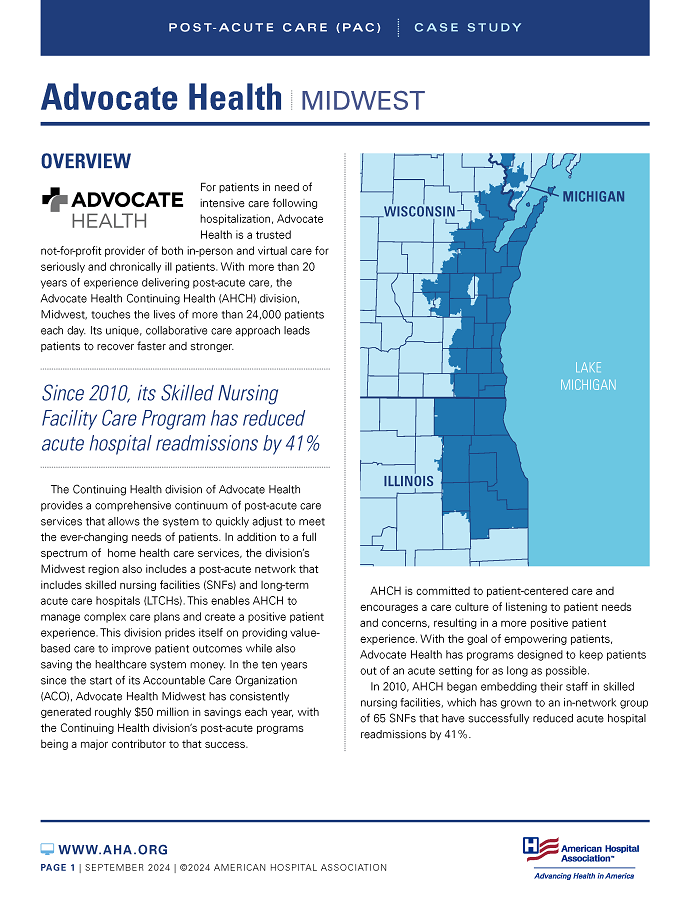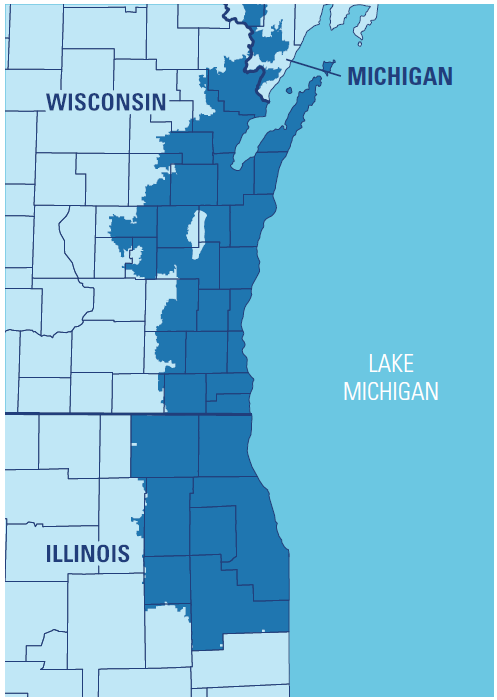

Advocate Health | Midwest
Post-Acute Care CARE (PAC) | Case Study
Overview
 For patients in need of intensive care following hospitalization, Advocate Health is a trusted not-for-profit provider of both in-person and virtual care for seriously and chronically ill patients. With more than 20 years of experience delivering post-acute care, the Advocate Health Continuing Health (AHCH) division, Midwest, touches the lives of more than 24,000 patients each day. Its unique, collaborative care approach leads patients to recover faster and stronger.
For patients in need of intensive care following hospitalization, Advocate Health is a trusted not-for-profit provider of both in-person and virtual care for seriously and chronically ill patients. With more than 20 years of experience delivering post-acute care, the Advocate Health Continuing Health (AHCH) division, Midwest, touches the lives of more than 24,000 patients each day. Its unique, collaborative care approach leads patients to recover faster and stronger.
Since 2010, its Skilled Nursing Facility Care Program has reduced acute hospital readmissions by 41%.
The Continuing Health division of Advocate Health provides a comprehensive continuum of post-acute care services that allows the system to quickly adjust to meet the ever-changing needs of patients. In addition to a full spectrum of home health care services, the division’s Midwest region also includes a post-acute network that includes skilled nursing facilities (SNFs) and long-term acute care hospitals (LTCHs). This enables AHCH to manage complex care plans and create a positive patient experience. This division prides itself on providing value-based care to improve patient outcomes while also saving the healthcare system money. In the ten years since the start of its Accountable Care Organization (ACO), Advocate Health Midwest has consistently generated roughly $50 million in savings each year, with the Continuing Health division’s post-acute programs being a major contributor to that success.

AHCH is committed to patient-centered care and encourages a care culture of listening to patient needs and concerns, resulting in a more positive patient experience. With the goal of empowering patients, Advocate Health has programs designed to keep patients out of an acute setting for as long as possible.
In 2010, AHCH began embedding their staff in skilled nursing facilities, which has grown to an in-network group of 65 SNFs that have successfully reduced acute hospital readmissions by 41%.
Patient-Payer Mix
Most AHCH patients are covered by public payers such as Medicare and Medicaid, which reimburse a disproportionate amount of care at a lower rate than costs. In Illinois, nearly half of AHCH patients are covered by Medicare (46.8%), including Medicare Advantage. Nearly 18% of Illinois patients are covered by Medicaid, while just one-third (32.6%) have commercial insurance. In Wisconsin, the figures are similar: 50.2% of patients are covered by Medicare (three-fourths of whom have Medicare Advantage), 15.4% are covered by Medicaid, and 32.25% are covered by commercial insurance.
AHCH’s patient population is also older than the average hospital population. This means more patients with severe, chronic conditions and a higher number of comorbidities.
Challenges
While AHCH continues to provide vital care to patients, it still faces serious challenges, including the serious strains caused by the impact of the pandemic.
1. Labor Challenges
As many other healthcare settings have recently experienced, AHCH faces shortages of vital staff members like nurses, as high labor costs and inflation continue to pressure the system. With increased demand from sicker patients and reimbursement levels that fail to meet these rising costs, AHCH has had to turn to more expensive temporary and travel workers to fill in the gaps, further exacerbating the labor challenges.
2. Medicare Reimbursement
The current model for reimbursement from the Centers for Medicare & Medicaid Services (CMS) reimburses providers based on the care type of setting rather than the acuity of the care provided. This means that the payment post-acute care providers receive often does not cover the total costs of the care they provide. The disconnect between the amount CMS reimburses and how much it takes to care for post-acute patients can threaten the financial stability of AHCH and patient access to care.
3. Financial Strain
As a nonprofit entity, AHCH has found it difficult to remain financially sustainable since the onset of the COVID-19 pandemic. With surging staff and supply costs alongside steep investment declines and decreased patient volume, Advocate Health continues to report large quarterly losses as it struggles to balance its operating margins. As the short-term aid from the federal government begins to end, AHCH may have to turn to cutting some clinical services to continue safely providing patient care.


